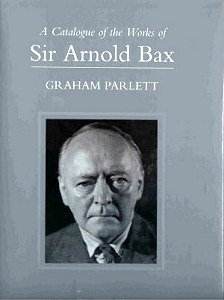Because I am late (very
late - four years in fact) in reviewing
this book many Bax enthusiasts will
already have it. Those who are still
dithering and who look for a lead let
me now give it. There is no getting
away from it; outright Baxians must
have this catalogue.
What is in this 412
page book?
There is the author's
four page foreword plus a six page introduction.
There the author has some provocative
things to say including a fatalistic
acceptance that, apart from Tintagel,
much of Bax's music is destined to remain
unheard in live performance.
There is a good swift
four page chronology of Bax's life.
Preliminary notes and an abbreviations
key provide the scene-setting for the
catalogue as well as giving addresses
for sourcing scores and performance
materials.
Then follows a chronologically
laid out catalogue of 386 entries. There
are well over 400 separate movements
of which nearly a quarter are orchestral.
Fifty chamber works are listed, sixty
pieces for piano, 25 choral items and
more than 130 songs. The composition
entries run from 1896 to 1953. This
main catalogue runs from page 31 to
page 277.
Each entry provides
details of the date, orchestral specification,
manuscript/location, publication details,
premieres, adaptations, composer programme
notes, corrections, research notes and
issues and ‘loose ends’. Cross-references
to the works of other composers are
also given.
Bax admirers will,
I guarantee, find something surprising
and challenging as they leaf through
these pages.
The Appendices are
valuable. There are lists of works by
genre (e.g. concert works for orchestra),
concordance of manuscripts, list of
recordings as at 1998 (and there at
the head of that section are Bax's words
- "The Gramophone is on the whole
a ghastly invention ...", 1929),
indices of poets, dedicatees, a list
of unfulfilled projects and a list of
literary works. There is the best Bax
bibliography I have encountered and
an index of titles and first lines.
There is an overarching index running
to 20 pages.
In many ways this book
completes the Bax documentation. There
is the opulence of Lewis Foreman's biography
(out of print now but perhaps to be
reissued in paperback), there is Colin
Scott-Sutherland's spiritual account
of the life and symphonies (1972), there
are the complete poems and there is
Mr Foreman's annotated version of ‘Farewell
My Youth’.
Let’s take ten treasurable
facts as illustration of the breadth
and richness of the catalogue entries:-
Bax felt that the
Overture, Elegy and Rondo,
the FS of which was stolen from
the lounge of the Park Lane Hotel
in 1930 was ‘amongst my brightest
and most optimistic compositions.’
The Hosting
At Dawn Fanfare, 1921, was Bax's
response to the invitation to many
composers to celebrate the launch
of the music magazine ‘Fanfare’.
Other fanfare contributors included
Goossens, Harrison, Holbrooke, Wellesz
and Felix White.
The Boar's Head
for male voices was written
for the Blackpool Festival Committee
for the 1923 competition which was
won by the Warrington Male Choral
Union.
The Variations
on the name Gabriel Fauré
for strings orchestra and harp
was written for Boyd Neel and premiered
by him in 1961. It was to have been
given again by Neel in 1977 but
this came to nothing
While I knew that
the Bax Fifth Symphony was premiered
at a Sargent-Courtauld concert on
15 Jan 1934, I did not know that
Beecham repeated it on 16 January.
Spring Fire
is well known to have been written
for the Norwich festival of 1914
but cancelled on the outbreak of
War. I had not realised that it
was dedicated to Henry J Wood.
Of the Fourth Symphony,
Christopher Whelen once recalled
Bax referring to it as 'my Sea Symphony’.
Did you know that
Bax wrote a sonnet to Fauré,
beginning "O unknown elder
brother across the sea / Thou singest,
and magic summers linger long"?
The Second Symphony
was to have been used as a ballet
by Walter Gore in the 1972 London
Festival Ballet season. It never
happened.
There you have it.
This book will enable all true Baxians
to triangulate their experience of this
composer and his music. It will play
its own part in prompting the musician
to try out this or that work, guiding
the conductor through the trauma of
performance, the collector will be prompted
to reach down that CD, LP or cassette
and the recording company to examine
the gaps (now precious few) in the discography
(Faure Variations, Victory March, the
very early orchestral works). If it
does then it will have more than justified
the long labour of love that this book
reflects and presents.
A book in which the
author’s affection for this music is
balanced with academic rigour - a guiding
hand; an authoritative friend.
Rob Barnett
